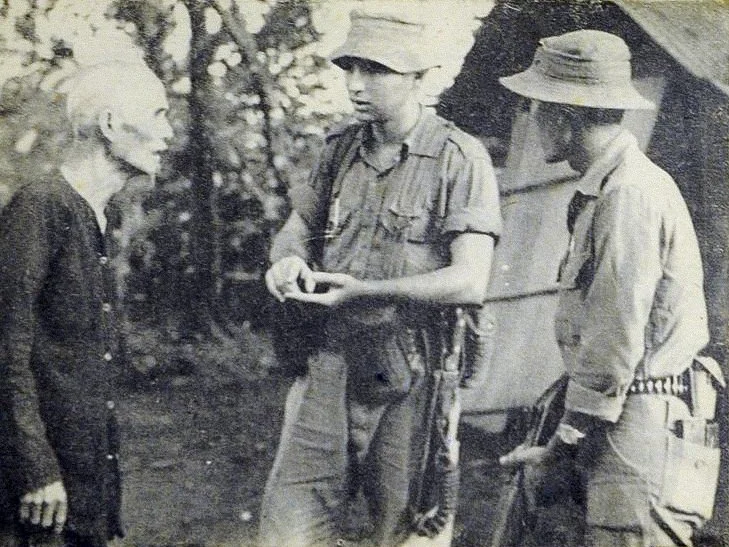Victor Danko – recollections of Middle Head
Two years as an army conscript in the 3rd intake of the Vietnam call-up, at the age of 21, left an indelible mark on the rest of Victor Danko’s life.
Now retired from an international business career, and living in Mosman, Victor has maintained his ADF connections, serving as a former President of the Mosman RSL Sub-Branch and taking an active part in Vietnam and army commemorations.
Victor Danko’s first experience of living in Mosman was very different to his life now.
After initial national service training in Singleton, North Head and South Australia in 1966, Victor was posted to Holsworthy with 131 Divisional Locating Battery as an artillery ‘surveyor’. Artillery surveyors take accurate measurements of the grid references for the guns to ensure that the shells hit the target.
From November 1966, he spent 3 to 4 months living in the timber barracks at Middle Head. He recalls, “Even though I was a ‘Nasho’ and in artillery, I was sent to Middle Head to be taught to speak Vietnamese.” He assumes he was selected for language training as he spoke several languages as a child. Victor’s early childhood was spent in war-ravaged Europe in refugee camps with his Russian Cossack parents, where he picked up languages easily.
He clearly remembers his time in the Barracks on Middle Head. “There were security guards 24 hours a day at the front gate. We were accommodated in the first two of the three wooden Barracks, and my room was in Building 2. On the ground floor of Barrack Building 1, closest to the oval, was our lecture room where the class of 12 to 15 men gathered. I was younger than the others and the only ‘Nasho’, which was known, and I was keen to do well and not be sent back early to Holsworthy.”
The language program covered practical communication, essentially made up of conversations, with some reading of basic Vietnamese sentences and translation of recordings from Hanoi Radio. Two of the lecturers were from Vietnam, from Hue University, and some military personnel. The program was well-planned and quite intense, with very little time off for socialising. Victor recounts that the difficult part was learning and remembering the tones – Vietnamese has seven tones, and these can change the meaning dramatically.
He was reminded of his status frequently when the lecturer would ask him to leave the room when sensitive intelligence matters were discussed. However, he remembers this quite fondly, as he could escape to the oval and relax on the grass!
After several months at Middle Head, Victor found himself in Vietnam, fighting in a guerrilla war he didn’t sign up for and facing death or maiming from mines. But Victor also remembers some of the lighter side, the camaraderie and the anecdotes. From time to time, his Commanding Officer would “lend” him to an infantry company which was preparing for an Operation. On one such occasion, he ended up in hospital in Vung Tau with other Australian servicemen, and was visited by a party of about 20 Vietnamese dignitaries and 10 or so Australian ‘hosts’.
ABOVE: clipping from the Mosman Daily 6 September 1967. Captioned: “Vietnamese linguist Lance-Bomardier Vic Danko, of Newcastle, questions a hamlet chief in the Vietnamese village of Hoa Long during the cordon and Search operation “Mosman” in Phuoc Tuy Province at the weekend. Along with a Vietnamese sergeant, right, Lance-Bomardier Danko spoke with several villagers concerning possible Viet Cong presence in the area. Only a handful of small arms ammunition, some barbed wire and an unexploded mortar flare were found, indicating the Viet Cong had lost control of the village.”
In Victor’s words, “The Australian guy hosting the Vietnamese dignitary (the deputy prime minister of South Vietnam) recognised me from the Middle Head program. He asked me to say something in Vietnamese. I looked over and saw one of the Vietnamese cleaners and said to her, ‘Ba, noi Bepa toi muan ban mi un curm’, which means ‘Gran, please tell the cook I would like to have some bread with my lunch’. The dignitary was quite impressed!
His connection to Mosman continued overseas, when he was sent on an operation (‘Operation Mosman’) and was photographed by a military photographer. The photo (above) appeared in the Mosman Daily and is now in the War Memorial in Canberra.
Like very many servicemen returning to Australia from Vietnam, Victor faced the humiliation of arriving home to anti-war protests and suffered from PTSD. He decided to study accounting and finance and subsequently left Australia for London and New York to work as a stockbroker.
Eventually returning to Australia, Victor reconnected with others who had served Australia and, through the years, has demonstrated his commitment to this country and honouring its heroes.
Future generations of Australians deserve the opportunity to hear stories of servicemen and women like Victor Danko.


